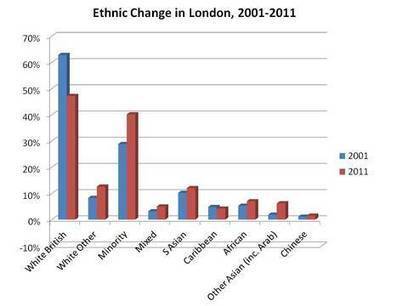Of all the changes announced by the 2011 census, one of the most startling is the rapid change in the ethnic composition of London's population.
Get Started for FREE
Sign up with Facebook Sign up with X
I don't have a Facebook or a X account
 Your new post is loading... Your new post is loading...
 Your new post is loading... Your new post is loading...
|

Brett Sinica's curator insight,
October 8, 2013 3:36 PM
Day to day, even looking into next year the rate of 2 millimeters per year may not seem drastic. To a city that has been around for hundreds of years, it's assumed the city plans to stay standing for hundreds more. Considering the age of the city, say in a couple hundred more years, some buildings could begin to take in water. It is also possible that certain parts of the city could be sinking faster than others. There is a similar situation in Mexico City where it was built on a lake and each year that source diminishes due to the demand of water by its residents. Certain parts of the city are sinking and some buildings are slanted due to the results. These cities are beautiful but reality shows that as time passes, it will probably only get worse. Hopefully preventions can be taken to at least reduce the speed of sinking so that people after us can appreciate the architecture and atmosphere the city has provided all these years.
Jacob Crowell's curator insight,
December 8, 2014 12:11 PM
Venice is a city that capitalized on its geography and developed canals so the city could grow despite being so close to sea level. Now that sea levels are rising, Venice is in trouble because its survival is dependent on the water levels, as they become out of control Venice will not be able to withstand the change. There are similar circumstances like in the Maldives where global warming and rising sea levels will put entire countries under water.
Kendra King's curator insight,
February 15, 2015 6:58 PM
As you mentioned in class, we are living on constantly moving land features. In the case of Venice, the water is moving in on the city so it is actually sinking and has been for quite some time. What is new to the equation is that it might be sinking “five times more than” originally “calculated or “7.8 inches every hundred years.” I say might be because there are others who quibble about this new find, saying it is inaccurate. Also, there is a damn project in the works to try and combat the sinking. While I am happy that the city is working on slowing the process, I am curious to know what their solution is going to be when the city finally does go under. As I was reading this all I could think of was saving all the rich art and history that this Italian city is famous for. In some ways it is great that the city knows ahead of time that it is sinking because they have time to plan a way to save the important aspects of the city. On another hand though, the city is so below sea level that a natural disaster could cause far more damage than anyone could have foreseen. I just hope that doesn’t happen anytime soon because Venice is definitely on my bucket list.
|












The most surprising piece of information in this article is that white Britons are leaving London because of the minorities that are moving in. As of 2013 only 59.9% of London was white, meaning that the miniorities are taking over Ethnic part of London much faster then first anticipated.
Since immigrants have flocked into London, it appears some of the White population has left the city because of it. The ethnic change is happening very quickly in London and White British population is no longer the majority. As large numbers of immigrants enter London, large numbers of White people leave the city. London is becoming a melting pot rather quickly.
If white flight is happening in Europe, where are all of its native migrating to? I know for years, there has been a large migrant population from the continent of Africa migrating to Europe, more specifically London, but where in the world could Britain's native be migrating to? Its common to hear of people migrating from rural areas to better neighborhoods, but with the influx of people looking for a better livelihood resemble that of the people living in countries such as India, China and Japan?